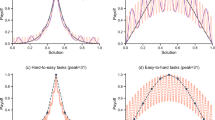Abstract
In this paper, we introduce an agent-based simulation for investigating the impact of social factors on the formation and evolution of task-oriented groups. Task-oriented groups are created explicitly to perform a task, and all members derive benefits from task completion. However, even in cases when all group members act in a way that is locally optimal for task completion, social forces that have mild effects on choice of associates can have a measurable impact on task completion performance. In this paper, we show how our simulation can be used to model the impact of stereotypes on group formation. In our simulation, stereotypes are based on observable features, learned from prior experience, and only affect an agent’s link formation preferences. Even without assuming stereotypes affect the agents’ willingness or ability to complete tasks, the long-term modifications that stereotypes have on the agents’ social network impair the agents’ ability to form groups with sufficient diversity of skills, as compared to agents who form links randomly. An interesting finding is that this effect holds even in cases where stereotype preference and skill existence are completely uncorrelated.
Access this chapter
Tax calculation will be finalised at checkout
Purchases are for personal use only
Preview
Unable to display preview. Download preview PDF.
Similar content being viewed by others
References
Albert, R., Barabási, A.: Statistical mechanics of complex networks. Reviews of Modern Physics 74(1), 47–97 (2002)
Burnett, C., Norman, T., Sycara, K.: Bootstrapping trust evaluations through stereotypes. In: Proceedings of the 9th International Conference on Autonomous Agents and Multiagent Systems, pp. 241–248 (2010)
Dall, J., Christensen, M.: Random geometric graphs. Physical Review E 66(1), 16121 (2002)
Denzinger, J., Hamdan, J.: Improving modeling of other agents using tentative stereotypes and compactification of observations. In: Proceedings of Intelligent Agent Technology, pp. 106–112 (2005)
Denzinger, J., Hamdan, J.: Improving observation-based modeling of other agents using tentative stereotyping and compactification through kd-tree structuring. Web Intelligence and Agent Systems 4(3), 255–270 (2006)
Gaston, M., Simmons, J., desJardins, M.: Adapting network structure for efficient team formation. In: Proceedings of the AAAI 2004 Fall Symposium on Artificial Multi-agent Learning (2004)
Gaston, M., desJardins, M.: Agent-organized networks for dynamic team formation. In: Proceedings of the International Conference on Autonomous agents and Multiagent Systems, pp. 230–237 (2005)
Glinton, R., Sycara, K., Scerri, P.: Agent-organized networks redux. In: Proceedings of AAAI, pp. 83–88 (2008)
Hamilton, D., Sherman, S., Ruvolo, C.: Stereotype-based expectancies: Effects on information processing and social behavior. Journal of Social Issues 46(2), 35–60 (1990)
Hendrichson, B.: Latent semantic analysis and Fiedler embeddings. In: Proceedings of the Fourth Workshop on Text Mining of the Sixth SIAM International Conference on Data Mining (2006)
Hilton, J., Von Hippel, W.: Stereotypes. Annual Review of Psychology 47 (1996)
Macrae, C., Bodenhausen, G.: Social cognition: Thinking categorically about others. Annual Review of Psychology 51(1), 93–120 (2000)
Marx, D.M.: On the role of group membership in stereotype-based performance effects. Journal of Social and Personality Psychology Compass 3(1), 77–93 (2009)
Osgood, C.: The measurement of meaning. Univ. of Illinois, Urbana (1975)
Author information
Authors and Affiliations
Editor information
Editors and Affiliations
Rights and permissions
Copyright information
© 2011 Springer-Verlag Berlin Heidelberg
About this paper
Cite this paper
Maghami, M., Sukthankar, G. (2011). An Agent-Based Simulation for Investigating the Impact of Stereotypes on Task-Oriented Group Formation. In: Salerno, J., Yang, S.J., Nau, D., Chai, SK. (eds) Social Computing, Behavioral-Cultural Modeling and Prediction. SBP 2011. Lecture Notes in Computer Science, vol 6589. Springer, Berlin, Heidelberg. https://doi.org/10.1007/978-3-642-19656-0_36
Download citation
DOI: https://doi.org/10.1007/978-3-642-19656-0_36
Publisher Name: Springer, Berlin, Heidelberg
Print ISBN: 978-3-642-19655-3
Online ISBN: 978-3-642-19656-0
eBook Packages: Computer ScienceComputer Science (R0)




